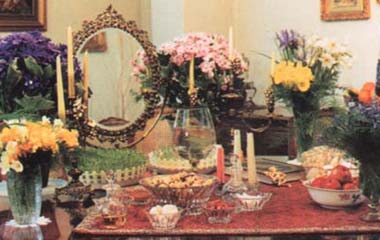
Nowruz, the Iranian year change is always celebrated widely. The Iranian, also those that live abroad, use to prepare the haft-Sin (table of the Nowruz) around the passage in to new year, wearing new dresses, offering Eidi to children (new cash notes usually), eating delicious meals celebrating the sizdebedar (13 Farvardins or 2 April). Iranian Moslems light on candles as symbol of the respect that the ancient persian had for the fire, and they set the holy Koran on the table of the Nowruz to show all of their respect that they have for this sacred book. In recent years, in to honor of the Nowruz, the Iranian have also shown all of their attachment to the customs and the national traditions firmly believing in the Islam. A few days before New Year’s eve they are taken some seeds of wheat in a dish with some water for germinating. Children are disguised by Haji Firuz of Dad western Christmas, dressed with garish, pants wide black gillets and the face Put make up on black, and wear customs of satin from the bright colors. These Hajis Firuz singing and dancing, they appear in the streets roads with tambourines and trumpets, and bring the good humor and the news of the arrival of the New Year. The eve of last Wednesday, of the year (Chahar Shanbeh Suri), the bonfires are turned on in the roads and the people jump above the flames, shouting: “Give to me your beautiful red color. My sickly pallor is brought away”!. The child-Haji Firuzes race for the roads drumming on pots and saucepans with spoons, called Ghashog-Zani, to chase out on last unlucky Wednesdays of the year, while they are knocking at the doors to ask offers. Some days before the New Year, in every family a special tablecloth is stretched called Haft-Sin (that it means “seven sin) on which seven dishes are put, every of which, it begins with the letter ” S ” (sinn). Eid-eh Shoma Mobarak! (Felice New Year). With a salutes cannonade shot by the soldiers announces the arrival of the Year people embrace and exchange of wishes: generally the party is tightly among the family ones, which start then to exchange the gifts: specially new banknotes. The feast of New Year’s eve lasts 12 days, that is the first 12 days of the year. The 13th day for every iranian is obligatory to be out house: according to the tradition this is the only way to hold the malignant spirits away from house. In their extreme attempt to enter, they play and if they don’t find anybody they go.